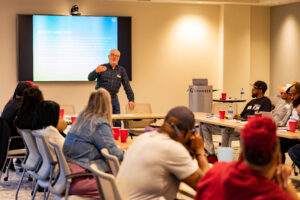The effects of the global pandemic have placed a tight hold on an already strained workforce. In 2021, approximately 47.4 million workers left their positions in search of better opportunities.
The same year closed with 4.6 million more job openings than unemployed workers, CNBC reports.
As employers find it increasingly difficult to maintain a full workforce, newly-graduated college students are still struggling to find jobs without prior experience.
Colleges and universities including the University of Tennessee at Chattanooga are working to close this disconnect and help students adapt to a constantly-changing workforce.
UTC partners with local companies to help students make connections and develop necessary skills that will help them become marketable for employment.
The university takes this idea a step further with their experiential learning program, ThinkAchieve. Courses here focus on a learning-by-doing ideology rather than traditional lecture and test classes.
TREND interviewed two UTC professors in the Gary W. Rollins College of Business (RCOB) sales department to learn how the university helps transition students from college to career — Christopher R. Plouffe, Ph.D., Endowed Chair in Sales; and David Locander, DBA, Associate Professor of Marketing.

The RCOB recently added a sales minor to their degree offerings with courses taught by Plouffe and Locander. Students who graduate from this program gain real-world experience and develop communication and work skills that companies look for.
“Our students graduate very job ready. They don’t need to be taught a ton more about selling to get going, all they need is industry knowledge,” Plouffe says.
“We do a really good job of taking things as far as we can with sales skills, and then we leave it to our industry partners to finish with the product training.”
Through Locander’s lectures, students are introduced to the “art of selling” — a concept that gives students a fundamental understanding of sales. Students then apply this knowledge to real-world situations through exercises that simulate pitching to potential buyers, working through sales calls and handling negotiations.
These situations are recorded and each student is required to complete a self-reflection based on the recording for further analysis — a common practice in the sales industry.

“When students graduate, especially through our program, they will come out with a good working knowledge of the sales process,” Locander says.
“There is always going to be a learning curve that you’re going to have to get under your belt before becoming efficient and effective in an industry. But with the knowledge you gain within the [Rolins College of Business] programs, especially through our sales programs, you come out with a working knowledge of the process. Students are not starting from scratch. They understand what they are supposed to do and how they are supposed to do it, so that learning curve gets shortened.”
UTC and other Chattanooga schools are working to adequately prepare students with necessary skills to succeed in their careers and professional lives. Through these efforts and more Chattanooga has become a top destination for entry-level workforce growth, LinkedIn News reports.
The Chattanooga Chamber and its community partners make major efforts toward education and talent development as stated in both Velocity 2040 and the five-year economic development plan, Chattanooga Climbs.
Learn about another talent development initiative, here.






